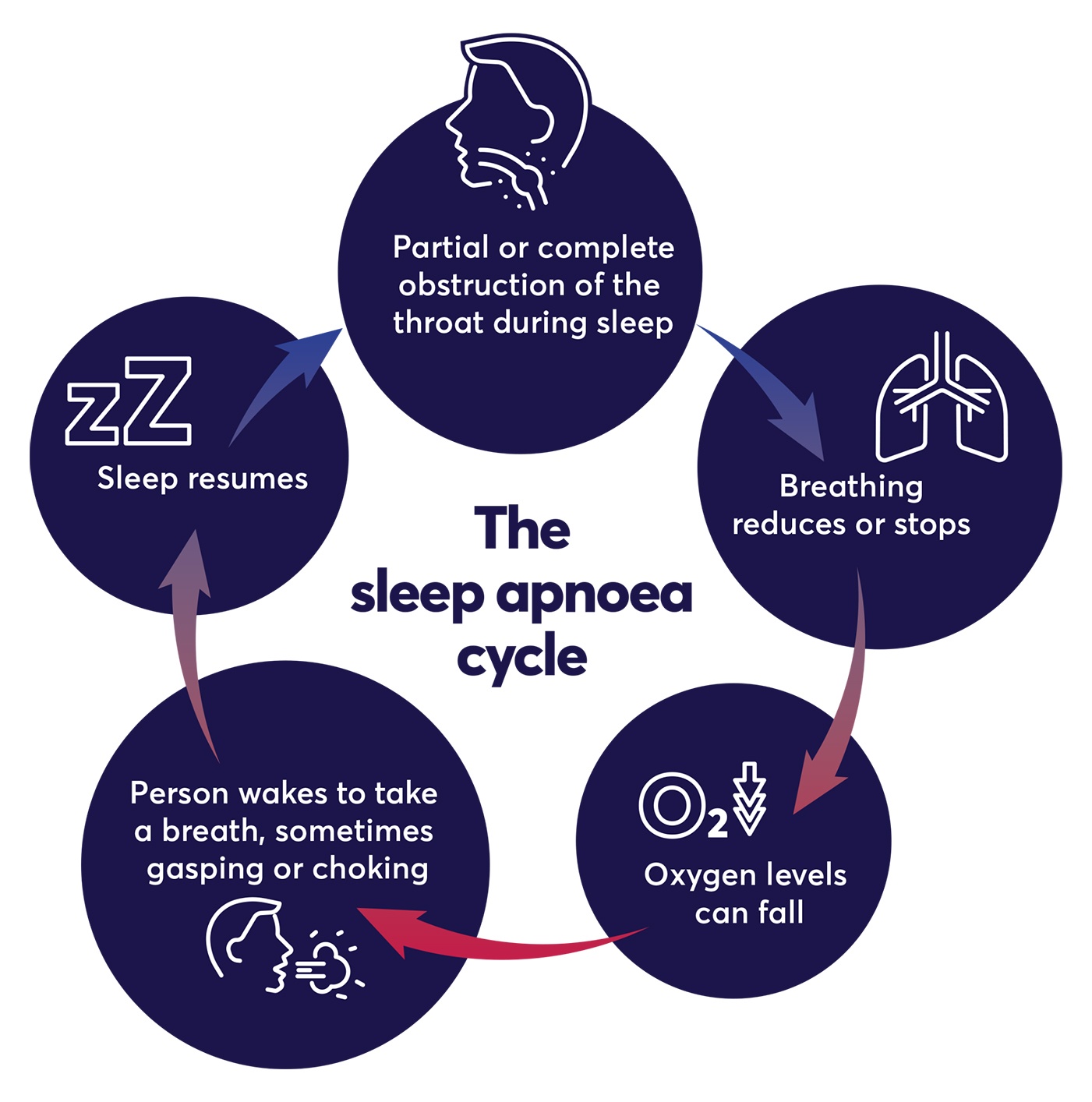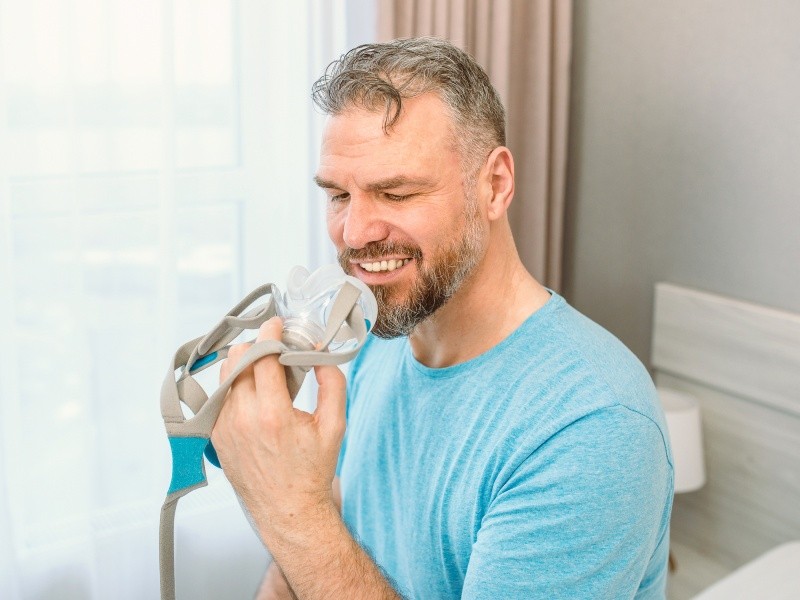- Home
- Mind & body
- A guide to sleep apnoea: the causes, types and treatment
At CBHS we help you manage your health challenges. We believe in offering you the services, support and tools you need to live your best life.
Health and Wellness Programs are available to support eligible members towards a healthier lifestyle. Each Health and Wellness Program is subject to its own eligibility criteria.
Contact us for more information and to confirm your eligibility for a program.
A guide to sleep apnoea: the causes, types and treatment

Sleep apnoea is a phenomenon that occurs usually at night during sleep when the throat becomes partially or totally blocked. This blockage can stop a person’s breathing for just a few seconds or even up to a minute.
Some people with sleep apnoea may wake briefly and not be aware of it happening. Then they often wake up in the morning feeling very fatigued and confused as a result of the disrupted breathing patterns during the night.
What causes sleep apnoea?
During sleep your throat muscles get floppy and the airway can narrow or close, hindering or even stopping the passage of air. The brain senses this and forces you to wake up to take a breath. This pattern can repeat itself up to 30 times an hour, or more.
Who is likely to experience sleep apnoea?
Men are more likely to experience the condition than women. It’s more common as you age, and you can make it worse by drinking too much alcohol or smoking. It’s also more common if you’re obese, you snore or if you have a family history of the condition. Children (and adults) with enlarged tonsils or adenoids can also experience sleep apnoea.
What does sleep apnoea look like?

Sleep apnoea can increase the risk of serious health conditions
If you – or someone you know – is struggling with the symptoms of sleep apnoea, it’s very important to seek treatment as soon as possible.
This sleep disorder can increase your risk of:
- High blood pressure
- Stroke
- Diabetes
- Depression
- Impotence
- Heart attack.
What’s more, daytime fatigue because of sleep apnoea can make concentration difficult and increase the risk of accidents at work and while you’re driving.
How is sleep apnoea diagnosed?
If you have a partner, they might notice you gasping or waking up at night, but you’re unlikely to know if you have it.
However, you can look out for some of the symptoms which include:
- Waking up with a dry mouth
- Feeling tired during the day
- Morning headaches
- Irritability.
If you think you have sleep apnoea, see your doctor as soon as possible. They will likely refer you to a sleep specialist for an overnight sleep study.
“Men are more likely than women to experience the symptoms of sleep apnoea.”
The three types of sleep apnoea
1. Obstructive sleep apnoea
Obstructive sleep apnoea (OSA) is the more common type. It can make you wake up many times a night, without even realising. OSA is caused by partial or complete obstructions of the throat that reduce breathing or stop it completely. Your body then interrupts your sleep so you can start breathing again. In some cases, this can happen hundreds of times a night. Snoring, obesity and sleepiness during the day could all signal possible issues with sleep apnoea. And while sleep apnoea surgery is a possibility, it’s only advised if all other therapies aren’t successful.
2. Central sleep apnoea
Central sleep apnoea is far less common than obstructive sleep apnoea. There is no blockage in the airway, instead there are brief pauses in sleep and the body makes no attempt to breathe during the pauses. In central sleep apnoea the brain may fail to transmit the proper signals to the muscles that control breathing. It may be caused by slow circulation from heart failure or muscle weakness caused by disorders like polio, or other illnesses.
3. Complex sleep apnoea
This type is a combination of OSA and central sleep apnoea. It doesn’t usually resolve by sleeping with a CPAP mask on or
other traditional OSA treatments.
What are the treatment options?
For mild sleep apnoea cases your GP might advise a combination of the following:
- Sleeping on your side
- Achieve a healthy weight
- Decrease or avoid alcohol during the evening
- Give up smoking
- Avoid sleeping tablets that can make the condition worse
- Nasal decongestant sprays.
For moderate to severe cases your GP might recommend:
- Mouthguard or splint, fitted by your dentist
- Sleep apnoea machine (CPAP)
- Surgery if other therapies fail.
What is a sleep apnoea machine or CPAP?
CPAP is an abbreviation for, a continuous positive airway pressure pump. And it’s the most effective treatment for moderate to severe sleep apnoea. You wear a mask over your face at night that's connected to the CPAP machine which works by delivering pressurised, oxygenated air into your airways. It pushes against any blockage to make sure your lungs get the oxygen they need while you sleep.

Best health insurance for sleep apnoea
If your GP recommends that you wear a CPAP, you can claim on the cost if you have Extras cover in your CBHS policy. The amount you can claim will vary depending on the level of your Extras cover. For more details and information on what you are eligible to claim under your current cover, please feel free to call our Member Care team.
“You may be able to claim on the cost of sleep studies, mouth guards and sleep apnoea machines, depending on your level of cover.”
Can obstructive sleep apnoea kill you?
With OSA, you’re at an increased risk of high blood pressure, stroke, diabetes, heart attack and depression. You are also two and a half times more likely to have a car accident. So if you believe you’re experiencing OSA, it’s important to seek treatment as soon as possible.
Do I have sleep apnoea? Take a free sleep apnoea test
If you think you’re experiencing sleep apnoea, you can take a free test. It’s also a good idea to speak with your general practitioner if you believe you’re experiencing symptoms during the night.
Some commonly asked questions
Is sleep apnoea hereditary?
It can be, yes. If a member of your family has sleep apnoea this could increase your chances of developing the sleep disorder. The shape of your face and skull and even the characteristics of your upper airway muscles can determine if you’re more likely to develop sleep apnoea at some point in your life.
Can sleep apnoea cause weight gain?
While obesity can also bring on sleep apnoea, the reverse is also true. Feeling the effects of fatigue and excessive lethargy as a result of this disorder, can have you reaching for the sugary,
fatty treats and mood-lifters during the day.
Can sleep apnoea cause weight loss?
The effects of sleep apnoea and a lack of good quality sleep won’t impact on your weight, however it can affect your body’s metabolism and its ability to regulate your weight.
Does my child have sleep apnoea?
If
you’ve noticed a change in your child’s behaviour or sleeping patterns, they may have a sleep disorder associated to sleep apnoea. You can take this
quiz in the first instance, but it shouldn’t be seen as a replacement to
seeking professional medical support from your GP.
Can a sleep apnoea pillow help?
There are many pillows currently being marketed as helpful with improving sleep apnoea – and in some very mild cases perhaps they can help. However, sleep apnoea bedding is not a cure for this
serious chronic condition and should never be used to replace professional medical advice.
“Children with enlarged tonsils or adenoids can also experience the symptoms of sleep apnoea.”
Getting a good night’s sleep again with the right treatment plan
There’s no denying that sleep apnoea can have a major impact on your quality of life particularly when it can increase your risk of other serious health issues like heart disease, strokes, diabetes and depression. But there is help at hand.
With the right treatment, you can benefit from consistently, uninterrupted sleep again and decrease your chances of ongoing chronic health issues. So, if you believe that sleep apnoea is the cause of your sleep deprivation and general fatigue, speak with your GP for an in-depth look at your sleep patterns. They will likely refer you to a sleep specialist who may conduct a sleep study for further details on how best to treat your condition.
All information contained in this article is intended for general information purposes only. The information provided should not be relied upon as medical advice and does not supersede or replace a consultation with a suitably qualified healthcare professional.
Sources:
https://www.healthdirect.gov.au/sleep
https://www.cbhs.com.au/mind-and-body/blog/sleep-and-fatigue
https://www.sleephealthfoundation.org.au/treatment-options-for-obstructive-sleep-apnea-osa.html
https://www.sleephealthfoundation.org.au/obstructive-sleep-apnea.html
Health and wellbeing
programs & support
You Belong to More with CBHS Hospital cover:
- Greater choice over your health options including who treats you
- Get care at home with Hospital Substitute Treatment program
- Free health and wellbeing programs to support your health challenges
Live your healthiest, happiest life with CBHS Extras cover:
- Benefits for proactive health checks e.g. bone density tests, eye screenings
- Keep up your care with telehealth and digital options
- Save on dental and optical with CBHS Choice Network providers
